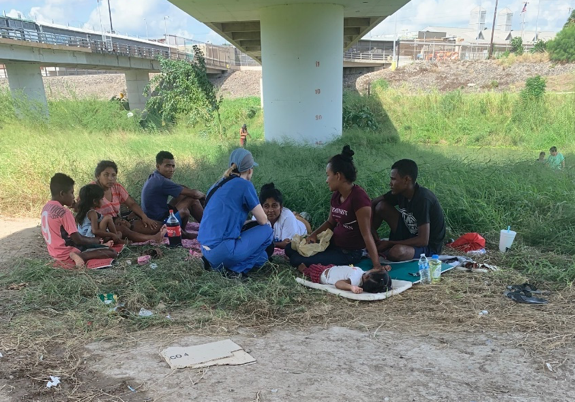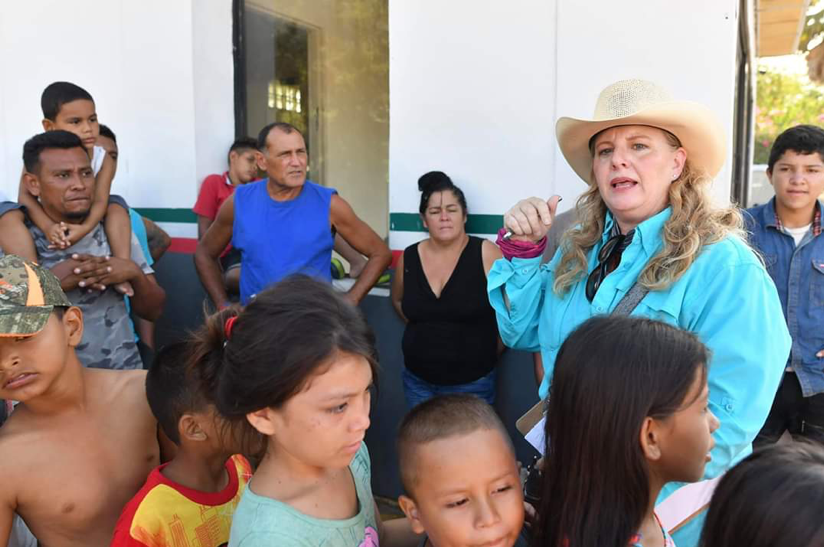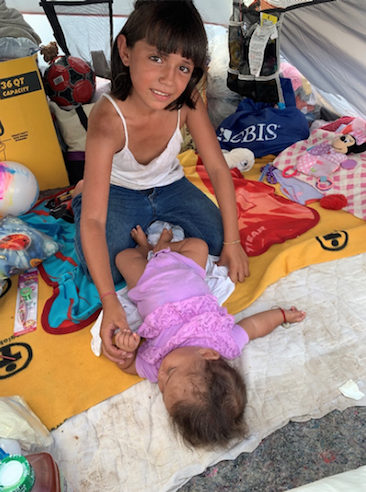A biotech attorney's experience with the 'guerrilla lawyers' at the border

A volunteer speaks to a family living under the Gateway International Bridge in Matamoros, Mexico. Across the bridge in the background is Brownsville, Texas. Photo by Jill B. Scott.
It’s Monday morning in October, and Jodi Goodwin, one of the Rio Grande Valley’s premier immigration lawyers, has just arrived at the big white tents set up as makeshift courts at the edge of the Rio Grande river in Brownsville, Texas.
Her clients, a family from Guatemala, have an initial asylum hearing at 12:30 p.m. The family lawfully requested asylum at the Gateway International Bridge that connects Brownsville with Matamoros, Mexico, several months ago.
They were immediately sent back to Matamoros under the Trump Administration’s Migrant Protection Protocols (MPP, colloquially known as “Remain in Mexico”) to wait several months for today’s hearing. During that time, they have been living in a makeshift refugee camp at the base of the bridge.
Goodwin, who took the case pro bono, approaches a Customs and Border Protection (CBP) officer outside the tent to go to her clients’ hearing. CBP does not let anyone from the public or the media to enter the secretive courts, and the officer initially refuses her entry, telling her that her clients did not show up at the bridge at 4 a.m. as required by CBP to be transported a few hundred yards away to the tent courts.
Goodwin knew this to be false, so she insisted that the officers look again for her clients. Lo and behold, they find them. Her clients’ toddler is in tears because he has been awake since 3 a.m. and has not been given anything to eat or drink in CBP custody.
Once she greets her clients, Goodwin reviews the posted docket. Her heart sinks as she sees that the entire 12:30 p.m. docket was inexplicably reset to 8:30 a.m., four hours earlier. How would Goodwin or her clients ever have known about this last-minute change when there was no notice? Since they failed to appear for their hearing (even though they were in CBP custody at 8:30 a.m.), the immigration judge ordered Goodwin’s clients to be ineligible for any relief, ending their asylum proceedings before they even had a chance to begin.
Goodwin is one of the lawyers on the front line at the border, part of a group of legal first responders who risk their own financial, physical and psychological well-being to serve refugees teetering on the edge of survival.
I met Goodwin when my mom, Alaska Retired Superior Court Judge Niesje Steinkruger, and I went to Brownsville and Matamoros for a week to volunteer.
Goodwin, the 2019 recipient of the American Immigration Lawyer Association’s Pro Bono Award and a self-described “guerrilla lawyer,” has an easy smile, coupled with eyes that have seen too much suffering.
“The cruelty is the point [of MPP],” says Charlene D’Cruz, the only full-time immigration attorney working in the camp in Matamoros. “Due process has been completely eviscerated at the border.”
Despite working in a system where, according to D’Cruz, “we have been regularly getting our asses kicked,” these dedicated lawyers fight to restore dignity and humanity for their clients.
 Jill B. Scott.
Jill B. Scott.
Crossing the Rio Grande
In order to understand the reality of MPP, my mom and I crossed the bridge into Matamoros with various aid groups to distribute supplies.
There are about 1,500 people living in the squalid tent camp, half of which are children, and according to Amnesty International, the cartel presence makes it too dangerous for humanitarian organizations to come in and provide regular food, water and sanitation.
Indeed, CBP has deemed Matamoros safe enough for refugees to wait months for their hearings, and calls any accounts of kidnapping and violence “anecdotal,” yet the State Department warns U.S. citizens that it is a “Level 4 – Do Not Travel” region “due to kidnapping and crime.”
As we walk through the camp we see sick children, listless in their parent’s arms. We hear several stories of violence, including an account of a limbless body floating in the river during the prior week. Out of extreme desperation, some parents have made the gut-wrenching decision to pin a note onto the shirts of their sick children and send them across the border by themselves, with the hope that it would save their lives.
I have struggled with how to make the tragedy of Matamoros come alive in a way that will do justice to the raw experience I witnessed. Of course, there is no justice in their raw experiences—that is the point. That is why these individuals and families seek asylum, to come to a country of principles and rule of law. But ask any immigration lawyer right now how they feel about rule of law, and you’re likely to get a sad shake of the head and a few choice words.
After passing out water, diapers and baby formula in the camp, my mom sat down on a concrete step and mused with bewilderment, “I spent 19 years on the bench and presided over many cases of child abuse and neglect where the government was trying to protect children from abusive parents. These parents are trying to protect their children from abusive governments coming at them from all sides.” To someone used to running a busy trial court with compassion, efficiency and procedural safeguards, MPP and the associated tent courts were an embarrassment.
 Jodi Goodwin talks with a group in Matamoros. Photo by Paul Goyette.
Jodi Goodwin talks with a group in Matamoros. Photo by Paul Goyette.
Looking for the Light
There is no denying the soul-sucking heaviness of Matamoros and the human toll of the policies of the current immigration system. But small cracks of light shine through the devotion of those who are in the trenches dealing with the fear, confusion and desperation of migrants on a regular basis.
Many of the lawyers helping in Matamoros are tied to Lawyers for Good Government’s Project Corazon. L4GG’s Project Corazon was created by Traci Feit Love in June 2018 in response to the child separation policies and expanded in August 2019 to address the crisis of MPP in Matamoros. “The first time I left the encampment in Matamoros and presented my passport to re-enter the U.S., I felt so guilty that I got to leave and they had to stay,” Love says.
Love used her organizational wizardry to pool resources from 50 major law firms and worked with Goodwin to help get Project Corazon off the ground in Matamoros. Now Project Corazon has two veteran immigration attorneys as Border Rights Fellows–D’Cruz doing intake in Matamoros, and Kim Hunter, who will soon be stationed across the river to attend hearings with clients in the Brownsville tent courts.
In just six weeks on the job, D’Cruz has created a sustainable infrastructure for L4GG’s operations in Matamoros, while giving each client dedicated one-on-one meeting time.
She created a program for remote preparation of asylum applications, where lawyers can volunteer from home in their fuzzy slippers, connecting with their client in Matamoros via WhatsApp.
And after a client had a seizure in her office, D’Cruz established a partnership with Global Response Management, which recently set up a presence in Matamoros to host medical volunteers (including some Cuban doctors living in the refugee camp who volunteer their services), in order to triage clients who need emergent or critical care.
As part of the partnership with GRM, D’Cruz has strenuously advocated at the bridge gate, standing side-by-side with clients, demanding that CBP officers follow the law to allow pregnant women and families who have children with visible disabilities and serious illnesses to enter the U.S. She recently saved the life of a septic two-year-old girl who needed immediate hospitalization by advocating for hours at the bridge for her and her family to be allowed to cross.
 A young girl comforts her baby sister in their tent in Matamoros. Photo by Jill B. Scott.
A young girl comforts her baby sister in their tent in Matamoros. Photo by Jill B. Scott.
Struggles after Arrival
But being permitted to cross into the United States can be the beginning of a new struggle for migrants. “If they weren’t damaged when they hit the border, the United States will sure do our best to do so when they get to detention,” says Hope Frye, a heavy hitter in immigration circles and former board president for the Center for Human Rights and Constitutional Law, which is class counsel for the children in the landmark case Flores v. Barr.
Some children are still being separated from their parents at the border, turning them into unaccompanied minors who are then sent to detention facilities. In fact, nearly 70,000 migrant children have been held in U.S. government custody without their parents in 2019, more than any other time on record in any country.
Frye warmly hugs me like an old friend when we meet for the first time. In addition to serving as the executive director of Project Lifeline, a nonprofit that coordinates legal and medical services for unaccompanied migrant children, she also leads Flores, monitoring visits to detention facilities holding children. The monitoring permitted under the Flores settlement is the only vehicle allowing for regular inspection of family detention centers, and Flores lawyers are permitted to interview any detained child.
Frye and her legal team document these children’s stories in declarations used in court actions to enforce the settlement. She recently testified before Congress about conditions in detention facilities in the Rio Grande Valley. In the last year, Frye led many Flores monitoring visits, all at her own expense.
Goodwin, Love, D’Cruz and Frye are not the only “guerrilla lawyers” who dedicate themselves to the unique challenges of refugee clients—there are many other whip-smart and courageous lawyers who run toward the fire instead of away from it (including many through the ABA Commission on Immigration).
“We speak of ‘immigrant children’ and forget that each one is a child—that boy with a lopsided grin, this tiny nursing baby with a shock of black hair,” Frye noted. “We protect ourselves by going numb or by becoming indignant yet divorced from the reality. Close your eyes and picture a child you know, and then imagine them alone, scared, locked up. If each of us did that, we’d have a massive national movement demanding the end to our barbaric practices.”
These lawyers meet their clients at the edge of the Rio Grande, offering to bear the weight of their suffering together. And together, through shared bravery, despair and resilience, they lift that burden enough to free their stories to the world.
Jill B. Scott is a biotechnology lawyer in Seattle, where she lives with her husband and two young sons. Her interest in immigrant health and human rights issues began when she participated in a refugee advocacy clinic in law school and when she interned at the World Health Organization in Geneva, Switzerland, as a Thomas Francis Jr. Global Health fellow. Her experience at the border keeps her motivated to volunteer with the Northwest Immigrant Rights Project and the Washington Immigrant Defense Network.
ABAJournal.com is accepting queries for original, thoughtful, nonpromotional articles and commentary by unpaid contributors to run in the Your Voice section. Details and submission guidelines are posted at “Your Submissions, Your Voice.”
Your Voice submissions

The ABA Journal wants to host and facilitate conversations among lawyers about their profession. We are now accepting thoughtful, non-promotional articles and commentary by unpaid contributors.

